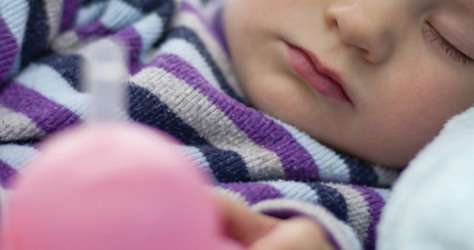Your toddler was protected from eight childhood diseases during their first year.
Now it’s time for the next set of immunisations. Here’s what to expect.
At a glance
- What immunisations to expect in your toddler's second year
- All about MMR
- Boosters

More protection for your little one
Just after your little one’s first birthday, they will be called up for three different immunisations: their first MMR vaccine, plus booster jabs for immunisations they’ve already had: Pneumococcal or pneumo jab (PCV) and Meningitis B. They will also have Hib/Meningitis C at one year old.
MMR
The MMR protects them against three infectious diseases – measles, mumps and rubella – and it’s important to take up your appointment as soon as possible after you’re offered it.
That’s because the side-effects of these diseases can be very serious, even life-threatening.
You’ll be an expert in immunisations by now – as your little one will have had eight jabs in their first year. So you’ll know that they will probably cry a little, may have a slight fever afterwards – but they’ll be generally fine.
Sometimes for mums it’s the thought of a jab that’s worse than the jab itself! Don’t forget to bring your Red Book to the appointment.
The MMR vaccine is given as an injection in the thigh or upper arm. There may be some redness and swelling afterwards, but it won’t last long. If your toddler has a high temperature it’s best to postpone the appointment until they’re better; get advice from your GP or practice nurse.
The MMR jab protects your little one from:
Measles
A viral infection that can lead to serious complications, sometimes fatal. These include a bacterial infection in the lungs (pneumonia) or the brain (encephalitis) and deafness. Outbreaks of measles are on the rise in the UK because of a fall in the number of children being vaccinated between 1998 and the mid 2000s. This was due to a scare about a possible link between the MMR and autism/bowel disease, but that research has since been discredited. Studies over the past 10 years have found no link between the MMR vaccine and autism.
Mumps
A viral infection that used to be common in children. It causes painful swelling in the glands below the ears. Serious complications are rare, but mumps can lead to viral meningitis if the virus moves to the outer layer of the brain. It can also affect fertility if it causes swelling of a man’s testicles or woman’s ovaries once they get past puberty.
Rubella
Also called German measles. Another viral infection; it causes a distinctive red rash made up of small spots. It’s dangerous for a pregnant woman to catch rubella in the first 20 weeks as it can disrupt the development of her baby.
Hib/Meningitis C
Protects against Haemophilus influenzae type b (Hib) and meningitis caused by meningococcal group C bacteria. It is given at one year of age and is a single jab containing protection against Meningitis C (second dose) and Hib (haemophilus influenza type B) (fourth dose).
Pneumococcal infection
This can also be done in the same appointment as the MMR at 12-13 months. It contains the second dose of the pneumococcal vaccine.
Meningitis B
Meningitis B also takes place at the same 12 month appointment. It’s a single jab containing protection against Meningitis B and is a booster dose of the injections that are previously given at 2 and 4 months (third dose).
This might seem like a lot of vaccines all at once, but don’t worry: the nurse or doctor should give each jab in a different place (usually thighs and upper arms). Although this might leave your little one looking a bit like a pin cushion, this stops each area from getting too sore. You might want to clear your diary for the rest of the day, and maybe the next one for cuddles and extra attention, just in case they’re feeling a little unimpressed with the whole situation or develop a mild fever as a result of all the jabs - and remember, you can always give them paracetamol if you think they need it.
Does the MMR vaccine cause autism?
The NHS says:
"There's been some controversy about whether the MMR vaccine might cause autism following a 1998 study by Dr Andrew Wakefield. In his paper published in The Lancet, Dr Wakefield claimed there is a link between the MMR vaccine and autism or bowel disease. But Andrew Wakefield's work has since been completely discredited and he has been struck off as a doctor in the UK.
Subsequent studies in the last 9 years have found no link between the MMR vaccine and autism or bowel disease."
Read our tips on best ways to cope on the day of your toddler's immunisations.
Find out about the next stage of your little one’s vaccination schedule.